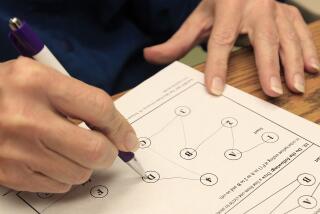Report Backs Nationwide Student Achievement Tests : Education: National Endowment for the Humanities supports Bush plan. Critics warn of unfair comparisons of schools.
- Share via
WASHINGTON — The National Endowment for the Humanities on Sunday endorsed President Bush’s proposal that achievement testing be established for high school students nationwide, saying it is needed to measure whether education meets minimum standards.
In a 117-page report, the independent government agency said the United States is the only major industrial nation that does not test what students have learned before they go on to college or into the work force.
It said the two main standardized tests currently administered--the Scholastic Aptitude Test and the American College Testing Program--measure aptitude, not achievement, and are taken only by college-bound students.
Lynne V. Cheney, who chairs the agency, said students should be required to take essay-type tests that make them accountable for what they have learned.
“Our most common, high-stakes examinations are divorced from the classroom study of subjects like history,” Cheney said. “They do little to advance the notion that hard work in school matters.”
The report, made public only a month after Bush unveiled several education proposals--among them nationwide achievement testing--is expected to add fuel to debate of the plan.
Cheney estimated that developing, carrying out and grading nationwide achievement tests could cost hundreds of millions of dollars each year. But she said that, with $200 billion already being spent annually on education, such expenses would be “quite justified.”
Some 20 states have expressed interest in giving the examinations to students who volunteer to take them. Cheney said that by the year 2000, she hopes to see voluntary testing in math, science, history, English and geography in the fourth, eighth and 12th grades.
The President’s proposals have sparked a storm of controversy. Some experts have expressed alarm over the notion of a common yardstick that could be used to compare a school’s performance with that of others across the country.
Melodye Bush, an education specialist at the Educational Commission of the States, said that judging schools by achievement test scores would harm schools that fare poorly on the exam and have only limited resources.
Nancy Kochuk, speaking for the National Education Assn., cautioned that school-by-school reporting of test scores would not take into account differences in the students’ economic status.
“It might be harder to educate students from disadvantaged backgrounds,” she said.
Some experts also say that nationwide exams might force educators to direct curriculum mainly toward teaching students how to take the exam, and thus might impede individual freedom and creativity in the classroom.
Kochuk said: “Teachers will complain that it detracts from what they’re really trying to teach.”
Cheney said, however, that having a national achievement test would not necessarily mean all students would take the same test, since states would be able to devise their own exams.
Chester E. Finn Jr., an education and public policy professor at Vanderbilt University, said he strongly supports nationwide achievement testing. “I think it’s an overdue idea,” he said.
Finn said that such an exam would present a more accurate picture of how well students and their schools are performing. “We’ve been getting misleading feedback on how we’re doing,” Finn said. “We get nothing but good news.”
The aptitude tests in current use measure only basic skills and tend to be multiple-choice. Because schools often compare their students’ scores with averages from several years ago, Finn said, these tests “tend to give deeply misleading results.”
Comparing the U.S. testing system to those used in other industrialized countries, the report describes exams in Britain, France, Germany and Japan, in which students must give written and oral responses to difficult questions on history and the humanities.
For most students in those countries, admission to a university depends largely on passing the national achievement test, the report said.
More to Read
Sign up for Essential California
The most important California stories and recommendations in your inbox every morning.
You may occasionally receive promotional content from the Los Angeles Times.










